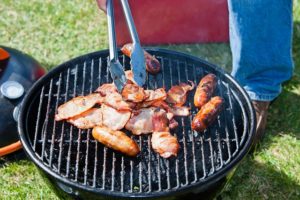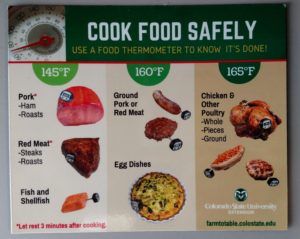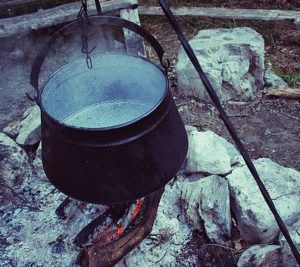Ahhhh…..you finally made it to your campsite. Life’s worries disappear as you relax in the sun. As you soak up the moment, your stomach growls, and you start cooking dinner. The last thing on your mind is food safety. Surely nothing in this pristine environment could make you sick, right?
Think again! Food safety in the great outdoors is just as important as food safety at home, especially since a foodborne illness could put an end to your adventure. Following these basic food safety practices will keep you from getting sick and allow you to keep adventuring!
Plan ahead.
 Planning ahead will ensure that you eat well and that your food stays safe. How many meals will you need? Will you cook with a camp stove, a grill, or a campfire? Do you need a cooler? These are all important questions to consider.
Planning ahead will ensure that you eat well and that your food stays safe. How many meals will you need? Will you cook with a camp stove, a grill, or a campfire? Do you need a cooler? These are all important questions to consider.
Keep hot foods hot and cold foods cold.
Harmful bacteria thrive at temperatures between 41°F and 135°F and can reach dangerous levels after only 1 or 2 hours. Store perishable foods at 41°F or colder by packing them in coolers. Instead of using ice, freeze milk cartons filled with water, or pack frozen foods and beverages in your cooler.
Use a thermometer to make sure you’re cooking food to a safe temperature.
- Cuts of pork, red meat, seafood- 145°F
- Ground pork or red meat; egg dishes- 160°F
- Poultry- 165°F
Once your meal is ready, either enjoy it immediately or put it in the cooler. Don’t eat leftovers that stayed out for more than 2 hours (or 1 hour if it’s 90°F or warmer outside).
Keep everything clean.
Even when you’re outside, wash your hands before handling food. Keep all cooking and eating utensils clean. If there’s no bathroom nearby, bring biodegradable soap for hand and dishwashing. Protect lakes and streams by washing dishes away from the water and by dumping dirty water on the ground, not directly into the water. Always keep raw meat or poultry separate from ready-to-eat foods like vegetables.
Minimize preparation.
Simplify the cooking process by packing canned, dried, or non-perishable items like canned chicken, powdered milk, or dehydrated meals.
Purify your water.
Always treat your water, no matter how clean it looks. Water can be treated by boiling for one minute (or several minutes at higher altitudes) or by using purification tablets or a filter.

